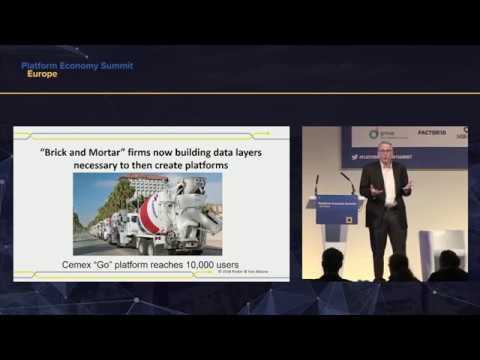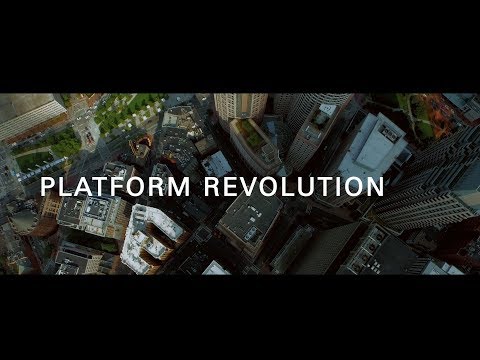Videos
Learn More About Geoff Parker
Why do organizations spend so much money trying to get things done with technology but fail so often? According to Geoff Parker, the Charles E. Hutchinson ’68A Professor of Engineering Innovation and executive director of the Master of Engineering Management Program at Dartmouth College, technology is widely available but not utilized properly, with the necessary data often locked in silos.
An expert on digital transformation, Parker observed the swift rise of platform-based businesses – companies that use technology to connect people, organizations and resources in an interactive ecosystem in which amazing amounts of value can be created and exchanged – like Amazon, Google and Facebook after the dotcom bust of the early 2000s. He and his co-authors were ahead of their time when they published the 2006 article for Harvard Business Review (HBR), “Strategies for Two-Sided Markets,” followed by their bestselling book “Platform Revolution: How Networked Markets Are Transforming the Economy and How to Make Them Work for You” in 2016.
Parker has since harnessed the theory and frameworks for two-sided markets powered by network effects to help non-platform companies successfully convert to a platform model to better compete in their industries.
“Platforms have become an incredibly powerful, lucrative and important phenomenon across the global economy,” says Parker, who was named one of Thinkers50’s top 50 management thinkers in the world in 2021. “Product-based businesses that have not yet converted to a platform model may realize the opportunities they are missing by asking themselves, ‘Do we want to make money by selling stuff or by facilitating transactions?’”
While the most recognizable platform businesses like YouTube and LinkedIn are consumer-focused, through his current research with the MIT Initiative on the Digital Economy, Parker says a shift is coming. Pointing to companies like Salesforce and SAP, he calls B2B platforms “the next emerging area for platform competition.”
Rethinking Supply Chains in the Digital Era
When discussing supply chains, most think of the long-chain models built decades ago and designed for the lowest cost. Those systems, however, were not prepared for today’s issues which include pandemics, war and climate change, among other global challenges. In this environment where IT and operations departments have converged, Parker says leaders must embrace a digital approach to supply chain management by using the data many organizations have already been collecting for years.
“There are no purely physical supply chains anymore,” explains Parker. “Every physical system is supported by a data system, and vast amounts of data exist for things that move, like ships and trains. Those data need to be harnessed and put to work. By aggregating that data to build digital supply chain systems, organizations can create routes that factor in a large variety of variables. Embracing a digital approach to supply chain management enables leaders to design for factors like lower emissions routes as well as formulate contingencies for unplanned disruptions like geopolitical flare-ups.”
Embrace Modern Value Creation, Close Digital Literacy Gaps and Prosper
Parker urges leaders whose business is embarking on digital transformation to recognize the fact that, more and more, value creation is coming from outside of firms, not inside. By linking different sides of customer networks – such as audiences and advertisers – and embracing the “inverted firm” production model, executives can employ powerful new forms of modern value creation. By closing their own gaps in digital literacy, leaders can take control of their organization’s destiny without exposing internal strategy.
“Don’t outsource the intimate parts of your business such as your users’ actual use cases” Parker cautions. “To effectively harness technology and make use of data to successfully deliver value, you have to know what you don’t know.”
Geoff Parker is the Charles E. Hutchinson ’68A Professor of Engineering Innovation and executive director of the Master of Engineering Management Program at Dartmouth College’s Thayer School of Engineering. He is also a visiting scholar and research fellow at the Massachusetts Institute of Technology (MIT) Initiative for the Digital Economy. He co-founded and serves as co-chair of the MIT Platform Strategy Summit, and in 2020, he was named a POMS Fellow by the Production and Operations Management Society – a lifetime achievement award. He previously served as director of the Tulane Energy Institute and on the General Electric (GE) Africa technical workforce advisory board.
Parker has made significant contributions to the field of network economics and strategy as co-developer of the theory of “two-sided” markets. His current research includes studies of distributed innovation, business platform strategy and technical/economic systems to integrate renewable energy.
HBR pieces that Parker either authored or co-authored have been included in multiple “Must Read” compilations, including; HBR’s 10 Must Reads on Platforms and Ecosystems (2020), HBR’s 10 Must Reads on Strategy, Vol. 2 (2020), HBR’s 10 Must Reads on Business Model Innovation (2019), HBR’s 10 Must Reads 2017, and HBR’s 50 Best-Selling Articles. In addition, he was a 2021 co-recipient of the Anti-Trust Writing Awards along with co-author Marshall Van Alstyne. Parker and Van Alstyne’s work was recognized by Thinkers50 in 2023 and 2021 when they were named among the top 50 management thinkers in the world and in 2019 when they won the Digital Thinking Award. In 2023, they were both named Marketplace Thought Leaders by Marketplace 50.
Parker advises senior leaders on their organization’s platform strategies, and he is a frequent speaker at industry events and academic conferences. His research has been funded by grants from the National Science Foundation, the Department of Energy, the Alfred P. Sloan Foundation and multiple corporations. He also serves or has served as a department or associate editor at various journals and as a National Science Foundation panelist. Parker co-authored the bestselling book “Platform Revolution: How Networked Markets Are Transforming the Economy and How to Make Them Work for You” with Van Alstyne and Sangeet Paul Choudary.
Parker earned an undergraduate degree in electrical engineering and computer science from Princeton University, a Master’s in engineering (Technology and Policy Program) from MIT, and a PhD in management science from MIT.
Geoff Parker is available to advise your organization via virtual and in-person consulting meetings, interactive workshops and customized keynotes through the exclusive representation of Stern Speakers & Advisors, a division of Stern Strategy Group®.
The Evolution of Data-Driven Supply Chain Management
It wasn’t long ago that IT departments were small and operated independently from the rest of an organization. In a time of digital transformation, however, IT and operations have collided. Dartmouth Professor of Engineering Innovation Geoff Parker says supply chains based on long form models created decades ago are now obsolete. In this compelling presentation, he’ll reveal that IT data expertise and the logistics proficiency of operations are working together to create data driven supply chain management. He’ll show that by aggregating vast amounts of data that already exist, organizations can create routes that factor in a large variety of variables. By embracing a digital, data-driven approach to supply chain management, leaders will be able to modernize antiquated systems and design for factors like lower emissions routes and resiliency to unplanned disruptions like geopolitical flare-ups.
Proactively Track Compliance With Data and Platforms
Staying in compliance with regulations is a complex task, but it’s also non-negotiable. Non-compliance could cost companies millions of dollars in fines. In this enlightening presentation, Dartmouth Professor of Engineering Innovation Geoff Parker demonstrates that most organizations already have the key to tracking compliance – data. With the growing emergence of business-to-business platforms, the process of aggregating, analyzing and applying pertinent data is already being streamlined, and technology is providing new, easier ways to proactively ensure ongoing adherence to reporting criteria. Parker applies his years of research and expertise on data aggregation and platforms to show leaders that by leveraging data an organization already possesses, staying on the right side of regulations is easier than ever.
The Platform Revolution Ramps Up for a Post-COVID-19 Economy
If your business has not yet transitioned to a platform model, you may find it unavoidable now. As many of us have witnessed, firms that already had a platform model in place prior to the crisis have fared much better. Decision makers now tasked with reframing their business models to meet the demands of the post-crisis economy will find Geoff Parker’s guidance, knowledge and frameworks around platform strategies invaluable. Drawing from his years teaching at Dartmouth and MIT and the groundbreaking book he co-authored, “Platform Revolution,” Parker discusses what a successful platform model looks like for your business and highlights the many opportunities platform models offer for exponentially increasing profits.
How to Monetize a Platform
Many non-platform businesses are unaware of the revenue opportunities they are missing out on by not converting to a platform model. And even platform-based businesses may not be fully optimizing their profit potential. Geoff Parker developed some of the original math behind two-sided markets and his co-authored Harvard Business Review article on the subject is a popular classic. In this talk, Parker draws back the curtain on the endless revenue opportunities and efficiencies platforms offer and teaches methods for leveraging third-party users to build on those profits and efficiencies – opportunities absent from traditional business models.
Architecture: The Right Way to Build a Platform
IT professionals can significantly contribute to growth by helping firms with traditional business models transition to a platform model. But building a successful platform requires knowing what components are necessary. Where do you start? How do platforms go viral? How do you engineer network effects? How do markets work? During this presentation, Geoff Parker teaches participants how growth and matching are done properly and offers up tools and frameworks for optimizing efficiencies and profitability within platforms.

Platform Revolution: How Networked Markets Are Transforming the Economy - and How to Make Them Work for You
(W. W. Norton & Company, March 2016)

B2B Platforms – Paving the Way to Success
(Capgemini Invent x MIT Initiative on the Digital Economy, October 2022)

Electric Vehicles Are a Platform Business: What Firms Need to Know
(California Management Review, July 2022)

Unlocking Business Model Innovation through Advanced Manufacturing
(World Economic Forum, January 2022)

Digital Platforms and Antitrust
(The Oxford Handbook of Institutions of International Economic Governance and Market Regulation, January 2022)

The EU Digital Markets Act: A Report From a Panel of Economic Experts
(Publications Office of the European Union, 2021)

Winning the Race for Survival: How New Manufacturing Technologies are Driving Business-Model Innovation
(World Economic Forum, May 2020)
Dartmouth Professor of Engineering Innovation Geoff Parker is a leading expert on digital transformation and leveraging data. Co-author of 2016’s groundbreaking, bestselling book, “Platform Revolution: How Networked Markets Are Transforming the Economy and How to Make Them Work for You,” he’s a valued advisor to leaders of B2B and B2C organizations who are embarking on digital transformation initiatives and contemplating large-scale digital investments. An expert on facilitating productive communication and coordination between operations, IT and the C-suite, Parker helps organizations harness potential and achieve digital literacy. Parker is available to discuss any or all the following topics during one-on-one or small group advisory meetings. Each program can be customized to meet the needs and goals of your organization with the added option of meeting virtually or in person.
- The Platform Revolution
- Creating a Data-Driven Supply Chain
- Achieving Digital Literacy
- The Upcoming Explosion of B2B Platforms
- Using Platforms and Data to Track Compliance
- Why is Healthcare Tech Behind in the Platform Revolution?
Platform Design, Management and Strategy
Firms like Amazon, Facebook, Kloeckner Metals, SAP and Siemens manage ecosystems in which third parties add value. In this interactive workshop, platform strategist Geoff Parker will explain how platform firms operate, disrupt incumbents and modify traditional rules of strategy. He begins by explaining the value and possibilities inherent in a platform model, then works with participants to break down their current business models. Along the way, Parker offers practical, understandable frameworks and opportunities to ask questions.
Praise for "Platform Revolution"
“Thorough and often provocative.”
“An authoritative guide to the role of online platforms: what they are, how they work, and what they mean for business and economics. Platform Revolution demystifies the concept by providing clear prose, insightful examples, and practical lessons.”
“Platforms have transformed the economy over the last two decades, but the biggest effects are yet to come. Platform Revolution provides the first comprehensive framework for platform strategy and for predicting the winners and losers of future disruptions.”
“Platform Revolution is a manual for the disruption of your industry. You can either read it or try to keep it out of the hands of your competitors―present and future. I think it’s an easy call.”
“Platform Revolution provides an exceptional synthesis of cutting-edge research that makes it must-reading for my MBA students. A key insight is that platform strategies can benefit all participants when they understand the underlying economics. Read the book and share it with your business partners. You’ll be glad you did.”
“In a very cohesive and comprehensive way, the authors provide deep conceptual insights and rich practical advice on platforms, the most important business organizations of our time.”
“In the digital economy, platforms are transforming industries at high speed. Platform Revolution is an inspiring guide for business leaders to transform existing businesses to platform businesses.”







































